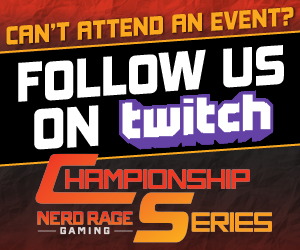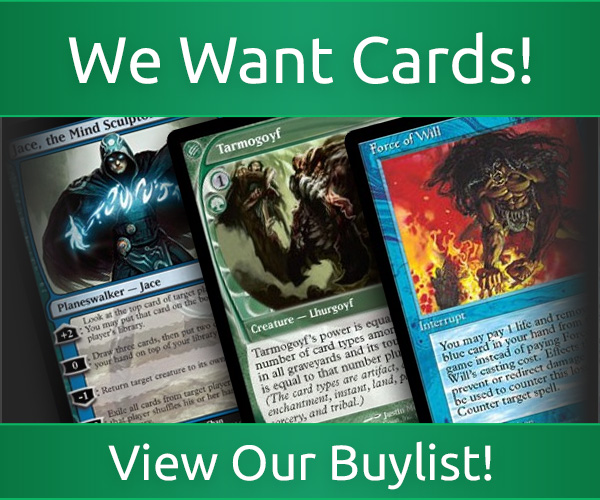Q&A: CTQ Winner Justin Brickman
Justin Brickman has been thinking a lot about last year’s Nerd Rage Gaming Championship Series.
about last year’s Nerd Rage Gaming Championship Series.
Specifically, the championship, and how he just missed qualifying for it as an at-large player. But so far this year, he’s in a good position to make up for that. He currently sits in first place in the points race, and would easily qualify for the championship if the season ended right now. He took over the top spot thanks to winning a Legacy CTQ earlier this month.
There’s still a ways to go, but Justin is in the best spot possible for any player who hasn’t automatically qualified. As you’ll see in this Q&A, he has no plans to let that slip out of his hands.
But first, his winning deck list:
Justin Brickman, Grixis Delver, 1st place, NRG Championship Series CTQ, July 1, 2017
Casey Laughman (CL): How long have you been playing Magic? What got you into the game and what keeps you interested in it?
Justin Brickman (JB): I started playing Magic during the original Innistrad, so it’s been about five-and-a-half years. I started playing very casually with some friends who introduced me to the game between rounds at a fencing tournament back in high school. Soon after, I started attending FNM at North Shore Comics (where Nerd Rage Gaming used to sell singles out of) and once I was introduced to the game competitively, I was hooked.
What really keeps me interested in playing Magic is the complexity of each game. This is more true with older formats compared to Standard, but every game has different decision trees and different paths that you need to navigate through to win.
CL: You’re known as someone who plays basically any format, but it’s not a stretch to say Legacy is clearly your favorite. What is it about Legacy that appeals to you?
JB: Legacy is in fact my favorite format, mostly due to the openness of the format and the love people have for the decks they play. To me Legacy feels like the most “personalized” format, as there is a deck to match any individual’s play style and preferences. Legacy players show a lot of love for their decks by filling them with foreign cards or foils, and to me that just shows a lot of dedication to not only the deck, but to the format and community as a whole. This is what first drew me to the format, but once I started playing I was taken in by how different the games felt from Standard or Modern.
My first Legacy event was an SCG Open several years ago (back when there was a Standard and Legacy Open the same weekend), and I played Burn to a solid 1-2 drop. One round I was paired against MUD, and it was turn 1 Chalice on the play against a hand of all one-drops into Platinum Emperion with Lightning Greaves. It was probably the most lopsided match of Magic I’ve ever played, and yet it only made me want to dive deeper into the format. Eventually I was able to afford more Legacy cards and was able to build some different decks over the years. Thankfully Nerd Rage Gaming has a great Legacy crowd that is dedicated to helping support the format and growing the community.
CL: How would you assess the state of Legacy now that it’s had some time to adjust to the bannings?
JB: The banning of Sensei’s Divining Top and the fall of Miracles left the format in a great place! Don’t get me wrong: I actually enjoyed playing against Miracles, but I understand the frustration of just being dead to Counterbalance or having to wait for Miracles players to take their sweet time spinning the Top. With the absence of Miracles, the format is incredibly open.
While I believe Grixis Delver is the best deck in the format, I don’t think it’s the uncontested best deck. People thought that without Counterbalance, combo decks like Elves and Storm would be a bit too good. While Storm has been putting up some good results on MTGO, the deck is very hard to play, and Lion’s Eye Diamonds aren’t exactly cheap and available. At GP Vegas we saw a ton of Grixis Decks and other fair decks with Death and Taxes taking the whole thing down. If basic Plains into Mother of Runes is too good, I’m very confidant Legacy is in a good place. I recently wrote about how I felt about the evolution of “Tundra” decks going back towards Stoneblade and how True-Name Nemesis is now public enemy No. 1 in fair matchups. So that might make the amount of Toxic Deluge and Golgari Charm go up over time.
CL: You won the CTQ with Grixis Delver, which is a slight departure from decks you’ve played recently. What made you decide Delver was a good choice generally, and what was it about this deck specifically that made you choose it?
JB: I’ve been playing Delver decks ever since 2015, with a few breaks in between to explore other options in the format. I picked up Delver mostly because Noah Cohen had been having a ton of success with it on the SCG Open Series and at Grand Prix New Jersey back in 2014. Noah was huge in helping me learn Legacy and BUG Delver, as there is a lot of customization in Legacy and you could play against just about anything. Since then, I’ve had a lot of success with BUG Delver, but have had Grixis on the back burner, mostly due to the dominance of Miracles and the power level of Abrupt Decay.
With Counterbalance basically out of the format, Abrupt Decay’s equity goes down quite a bit and Tarmogoyf is not exactly the best threat, as True-Name and Fatal Push are making their presence know in Legacy. This led to testing Grixis post-Top banning.
The huge appeal to Grixis Delver is that it has game against everything and is incredibly consistent. The deck is nearly all four-ofs, and the sideboard is flexible and offers you multiple different tools to combat any given matchup. What makes the deck feel truly over the top is the combination of Young Pyromancer and Cabal Therapy. Being able to strip your opponent’s hand is incredibly powerful, but building a board presence while doing so is just insane. Gitaxian Probe is what really makes Cabal Therapy as powerful as it is. Being able to flashback for free and guarantee a hit will almost always put you significantly ahead.
One of the bigger disagreements over Grixis Delver decks is whether to play Cabal Therapy or play Stifle. There is merit to both sides and each is better in specific metagames, I personally like to take the more proactive approach, especially when I have Young Pyromancer in my deck.
CL: If you were going to a Legacy GP this weekend and could play anything, would Grixis Delver still be your choice, or do you feel like it was a good metagame call?
JB: I’d 100 percent run back Grixis Delver! I’ve got years of experience playing different Delver decks and I believe success in Legacy comes from knowing how to play your deck better than your opponent, rather than having the best deck for the tournament.
CL: You were close to making last year’s championship, and right now you’re in a great position to make this year’s. Have you done anything differently this year that you feel has helped give you an edge in qualifying?
JB: Last year I found myself in the position of needing one more finish to be easily in the championship, and it was like that for about six months. After missing last year’s Championship, I spent a fair amount of time reflecting on how I prepared for events last year and adjusted my preparation process, starting with helping Dakota Clark, Peter Tragos and Tommy Tomsovic prepare for the Championship.
What I noticed was that I was trying to out-metagame the field in a 40-50 person tournament instead of making educated choices about what the best choice for an event would be. A perfect example of that is the Bant Tamiyo deck I played in the final 2016 CT. I just needed to finish top 16 to lock in a spot in the championship. I could have easily just played one of the Rock, Paper, Scissors decks that Kaladesh Standard had to offer, but I got a little too cute and cost myself a year of hard work. It was not a good feeling, and I told myself that there is no way I am not playing in the 2017 Championship.
Now that CTs are 100 players, metagaming is much harder to do. Since most of the events have been Modern or Legacy, I’ve had time to pick a deck and take a few weeks to learn it inside and out. CTQs also give a huge boost in events to give a lot of information about what is performing well on the series.
My testing process this year has also changed quite a bit. I used to start thinking about the next CT a week or two in advance, but now I start thinking about the next CT or CTQ right after the previous one. I’ve always been a competitive person and after missing the championship last year, when Norm Cohen announced the MVP race, I knew that would be what I’d chase after this year and now that I’m at the top of the leaderboard I’m not planning on giving it up!
CL: How have the CTQs changed your approach towards trying to qualify for this year’s championship?
JB: CTQs are the key to making the championship right now, and that is a little unsettling as it devalues the CTs by a reasonable amount. Looking at the leaderboard, if the year ended today, all of the players who would be in the championships via at-large bids have 10+ points from CTQs. CTQs account for anywhere from 34 to 72 percent of their points. This puts a huge premium on CTQ points, as it seems you can’t climb the leaderboard without them.
CTQs as a model are fantastic, making every event matter (which for coverage and leaderboard shake ups is great) but creates some problems, as CTs no longer feel like the Marquee events. I’ve made an effort to attend every CTQ I could and have had a couple two-point and one-point finishes in addition to my win, and after every event I’m just thinking about how much this affects the leaderboard and what finish I need to stay in a good place for the championship. Looking forward I expect to only see more CTQs and so something needs to be adjusted by either scaling the CT points higher or simply capping the amount of CT points you can have per year (similar to the Pro Point Cap for Grand Prix). But that’s for Norm and Max to figure out for next year. As for the rest of this year, it seems like if you want to be in the championship, grinding CTQs is your best chance to make it in.
Justin Brickman won a Legacy CTQ in July 2017 and as of this writing, is in first place in the NRG Championship Series points race. Casey Laughman is editor of Nerd Rage Gaming. Email comments and questions to claughman@gmail.com. This transcript has been lightly edited for grammar and clarity.




